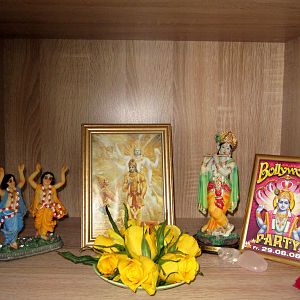1. Keeping a special place for your deity or image:
Create a special place in your house or apartment where you want to invite the deity or image to stay. Make that place beautiful and keep it very clean. This place is like an altar. You may decorate it in whatever way your inspiration tells you. Allow the deity or image itself to guide you.

Every morning you greet the deity by bowing down and then observing his beautiful form. Some altars are equipped with a curtain, which you can open every morning to greet the deity and close at night when you take the deity to rest.
2. Offering incense, lamp and flowers
On a daily basis, if possible, offer these items to the deity. This could be seen as a ritual, but its actual purpose is your expression of devotion.
If incense is unavailable you can use another item that creates a clean and fragrant atmosphere. Traditional lamps for worship are made of ghee, but you can use a candle as well. Flowers should be natural flowers, not plastic. If no flowers are available you could also use leaves.
You can simply place these items directly on the altar, offering them to the deity with devotion. Another form of offering includes a small ceremony.
In a simple ceremony take each item in your right hand and do seven circles clockwise around the deity, if you have several deities, do seven circles around each deity. While circling you can ring a small bell with your left hand.

If one offers Me with love and devotion a leaf, a flower, fruit or water, I will accept it. (Bhagavad-gita 9.26)
O son of Kunti, all that you do, all that you eat, all that you offer and give away, as well as all austerities that you may perform, should be done as an offering to Me. (Bhagavad-gita 9.27)
3. Offering water and food
You can keep a small cup next to the deity for his use. Supply fresh water daily or several times a day.
You should also daily offer some food to the deity. For this purpose you may get some small bowls and/or plates for the exclusive use of your deity.
Whatever you cook or prepare, put a small sample portion of it on the plate of the deity and place it in front of Him. In a prayerful mood ask the deity to accept your offering. There are also some mantras you could recite. You could ring a small bell during the process.

Leave the food for a few minutes on the altar giving the deity time to enjoy your offering. Then take the food from the altar after thanking the deity for accepting the offering or reciting mantras and again ringing the bell.
After washing the plates of the deity you may eat yourself. The food (or drink) has turned into prasadam.
This is a very meaningful detail in bhakti. Although the food is externally unchanged, it has changed its internal quality, it has become spiritual. Because it has been tasted first by the Lord, it has become transcendental, a source for spiritual progress and transcendental happiness.
Do this daily and see how blissful you become and how your house changes into a spiritually blessed place.
A bhakta offers all his food and drink to the Lord. When you are not at home you can offer your food mentally, it doesn´t matter. But try to offer at least one meal daily on your altar.
For Krishna and all his expansions or incarnations all offerings have to be strictly lacto-vegetarian. The Supreme Lord doesn’t accept any offerings that include meat, fish or eggs.
In India’s spiritual heritage some traditions allow the offering of meat or fish on an altar, but these are offered to the deity of a deva, like Goddess Kali, not to the Supreme.
Prasadam or spiritual food is an essential means for the spiritual advancement of the bhakta. It is spiritually powerful and practical at the same time.
4. Offering dress and ornaments
Arcanam means treating the Supreme Lord on a personal level, with respect and reverence. As the Supreme Person, the Lord has transcendental senses and thus enjoys our offerings and, above all, the loving devotion of His devotee.
Of course, the Lord does not depend on our supplies as He is the source of everything and thus naturally possesses and controls everything. However, He does not possess your love, because this is your property, your choice.
The deity form of the Lord often wears clothes, ornaments and a crown or turban. It is therefore appropriate to change his clothes and ornaments from time to time.
In the temple, this is done several times a day, or at least daily. At home, you can adapt this activity to your personal means and circumstances.
You’ll need, of course, some sets of dresses and ornaments. You may manufacture these on your own or ask someone to make them for you. Alternatively, you may purchase deity clothes and ornaments from special shops in India. As deity worship at home is a very common affair in India, there are all kinds of clothes and sizes available.